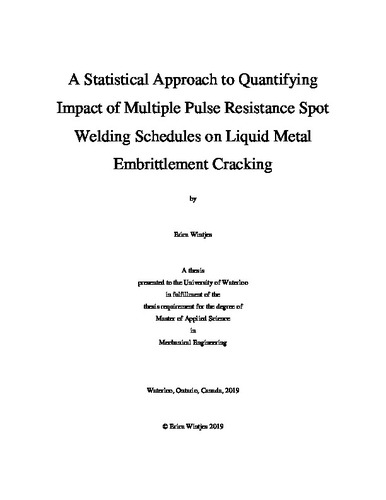UWSpace will be migrating to a new version of its software from July 29th to August 1st. UWSpace will be offline for all UW community members during this time.
A Statistical Approach to Quantifying Impact of Multiple Pulse Resistance Spot Welding Schedules on Liquid Metal Embrittlement Cracking
| dc.contributor.author | Wintjes, Erica | |
| dc.date.accessioned | 2019-04-26 18:38:03 (GMT) | |
| dc.date.available | 2019-04-26 18:38:03 (GMT) | |
| dc.date.issued | 2019-04-26 | |
| dc.date.submitted | 2019-04-11 | |
| dc.identifier.uri | http://hdl.handle.net/10012/14573 | |
| dc.description.abstract | Advanced high strength steels (AHSS) are advantageous for automotive applications due to their excellent strength and ductility. However, when coated with zinc for corrosion protection, these steels are susceptible to liquid metal embrittlement (LME) during welding. In this work, a new metric was developed to quantify LME severity and this metric was used to study the influence of multiple pulse weld schedules on LME cracking in resistance spot welds. Several conflicting reports have been released about the effect of LME on mechanical performance of resistance spot welds. In this work, a new method of LME crack quantification called a “Crack Index” was developed to link LME crack distributions in resistance spot welds to weld performance. The crack index is calculated by multiplying the lognormal median crack length by the number of cracks per weld and dividing by the sheet thickness. Because studies have established both crack size and location as vital factors affecting weld strength, both of these factors must be taken into account when characterizing LME severity. Lognormal median crack length is used as the parameter for crack size because the crack lengths measured in LME affected welds were observed to fit a lognormal distribution. Number of cracks is used to account for the probability that a crack may be found in a critical location and sheet thickness is used as a normalization factor. The crack index has a linear relationship with weld strength loss. The crack index analysis method was used to study the influence of multiple pulse welding schedules on LME severity. Pulsing was applied using two different methodologies: pulsing during the welding current to manage heat generation and a pre-pulse before the welding current to remove the zinc coating. All welds made using a double-pulse welding schedule exhibited less severe LME cracking than those made with a single pulse schedule with a similar nugget diameter. A double-pulse schedule with two equal length pulses showed the least severe LME cracking and a schedule consisting of a short pulse followed by a long pulse resulted in the most severe LME. This is due to both a difference in the amount of free zinc available for LME and the different thermal and stress profiles of the pulsing conditions. The majority of pre-pulse welding schedules caused an increase in LME cracking due to the additional heat introduced into the weld. However, a 4 kA pre-pulse (low current), applied for 3 cy (low time) was able to reduce LME cracking in TRIP1100, a LME crack susceptible alloy, by almost 30%. The 4 kA, 3 cy pre-pulse reduced the amount of free zinc for LME, without introducing too much additional heat into the weld. | en |
| dc.language.iso | en | en |
| dc.publisher | University of Waterloo | en |
| dc.subject | liquid metal embrittlement | en |
| dc.subject | resistance spot welding | en |
| dc.subject | advanced high strength steel | en |
| dc.subject | weld strength | en |
| dc.subject | cracking | en |
| dc.title | A Statistical Approach to Quantifying Impact of Multiple Pulse Resistance Spot Welding Schedules on Liquid Metal Embrittlement Cracking | en |
| dc.type | Master Thesis | en |
| dc.pending | false | |
| uws-etd.degree.department | Mechanical and Mechatronics Engineering | en |
| uws-etd.degree.discipline | Mechanical Engineering | en |
| uws-etd.degree.grantor | University of Waterloo | en |
| uws-etd.degree | Master of Applied Science | en |
| uws.contributor.advisor | Zhou, Norman | |
| uws.contributor.advisor | Biro, Elliot | |
| uws.contributor.affiliation1 | Faculty of Engineering | en |
| uws.published.city | Waterloo | en |
| uws.published.country | Canada | en |
| uws.published.province | Ontario | en |
| uws.typeOfResource | Text | en |
| uws.peerReviewStatus | Unreviewed | en |
| uws.scholarLevel | Graduate | en |

